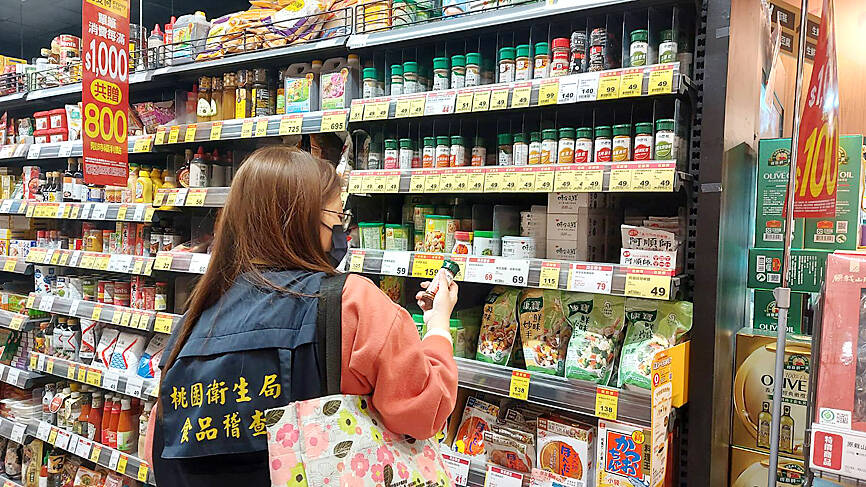PX Mart stores across Taiwan are recalling a brand of chili powder after it was found to contain a carcinogenic dye.
The Yunlin County Public Health Bureau on Wednesday found that the red chili powder produced by Chiseng Hong Ltd (濟生) contained 18 parts per billion of Sudan III, an industrial dye banned in food products.
Officials launched an investigation on Jan. 19 after receiving a tip-off from the public, the bureau said, adding that the chili powder is part of a four-in-one seasoning product produced by the Yunlin-based firm and sold exclusively at PX Mart, which is operated by Pxmart Co Ltd (全聯實業).

Photo courtesy of the Taoyuan Department of Health
The manufacturer on Tuesday said it had notified its clients to recall the product, the bureau said.
As the testing results are clear, the case has been transferred to the Yunlin County Prosecutors’ Office for investigation, and local health authorities nationwide have been informed of the finding, bureau Director Tseng Chun-mei (曾春美) said.
Yunlin County Commissioner Chang Li-shan (張麗善) warned the public against eating the chili powder, as long-term consumption of the dye could damage the liver and kidneys, and might increase the risk of cancer.
Since the notice was sent out, health departments across the country have ordered PX Mart to remove the product and have been inspecting locations to ensure compliance.
On Thursday, the Taipei Department of Health said that 1,091 jars had been removed in the city among the 11,824 that had been recalled nationwide.
The Taichung City Government said that of the 1,848 jars that were distributed to PX Mart stores in the city, 1,703 had been taken off the shelves, meaning that 145 had already been sold.
The New Taipei City Department of Health said it has sent its own samples for testing.
Other downstream producers that use chili powder from the original importer based in New Taipei City have been ordered to hold their products until further testing can be conducted, it added.
After receiving the notice from New Taipei City, the Kaohsiung Department of Health on Thursday recalled two batches of cayenne chili powder produced by Mares International Trading Co (瑪爾氏國際貿易), which used 25kg of chili powder from the importer.
The company purchased the raw material in November last year and used it in products manufactured from Nov. 27 to Jan. 25, it said yesterday, adding that six downstream retailers have been ordered to issue a recall.
Anyone who has purchased a jar of cayenne chili powder with an expiration date of Nov. 27 next year or Jan. 16, 2026, can take the product and their receipt back to the store where it was purchased for a refund, the Kaohsiung department said.
Additional reporting by CNA, Su Meng-chuan and Hsu Li-chuan

EUROPEAN TARGETS: The planned Munich center would support TSMC’s European customers to design high-performance, energy-efficient chips, an executive said Taiwan Semiconductor Manufacturing Co (TSMC, 台積電), the world’s largest contract chipmaker, yesterday said that it plans to launch a new research-and-development (R&D) center in Munich, Germany, next quarter to assist customers with chip design. TSMC Europe president Paul de Bot made the announcement during a technology symposium in Amsterdam on Tuesday, the chipmaker said. The new Munich center would be the firm’s first chip designing center in Europe, it said. The chipmaker has set up a major R&D center at its base of operations in Hsinchu and plans to create a new one in the US to provide services for major US customers,

The Ministry of Transportation and Communications yesterday said that it would redesign the written portion of the driver’s license exam to make it more rigorous. “We hope that the exam can assess drivers’ understanding of traffic rules, particularly those who take the driver’s license test for the first time. In the past, drivers only needed to cram a book of test questions to pass the written exam,” Minister of Transportation and Communications Chen Shih-kai (陳世凱) told a news conference at the Taoyuan Motor Vehicle Office. “In the future, they would not be able to pass the test unless they study traffic regulations

GAINING STEAM: The scheme initially failed to gather much attention, with only 188 cards issued in its first year, but gained popularity amid the COVID-19 pandemic Applications for the Employment Gold Card have increased in the past few years, with the card having been issued to a total of 13,191 people from 101 countries since its introduction in 2018, the National Development Council (NDC) said yesterday. Those who have received the card have included celebrities, such as former NBA star Dwight Howard and Australian-South Korean cheerleader Dahye Lee, the NDC said. The four-in-one Employment Gold Card combines a work permit, resident visa, Alien Resident Certificate (ARC) and re-entry permit. It was first introduced in February 2018 through the Act Governing Recruitment and Employment of Foreign Professionals (外國專業人才延攬及雇用法),

‘A SURVIVAL QUESTION’: US officials have been urging the opposition KMT and TPP not to block defense spending, especially the special defense budget, an official said The US plans to ramp up weapons sales to Taiwan to a level exceeding US President Donald Trump’s first term as part of an effort to deter China as it intensifies military pressure on the nation, two US officials said on condition of anonymity. If US arms sales do accelerate, it could ease worries about the extent of Trump’s commitment to Taiwan. It would also add new friction to the tense US-China relationship. The officials said they expect US approvals for weapons sales to Taiwan over the next four years to surpass those in Trump’s first term, with one of them saying